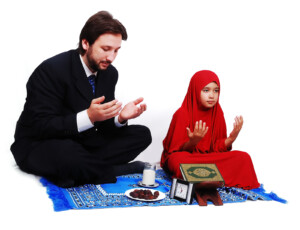By Nabeeha Malik
There are over 83,000 Muslims currently residing in Ireland, meaning there’s a good prospect that someone you know – a colleague, a friend, a classmate, or a neighbour may be fasting during the holy month of Ramadan.
But what is Ramadan exactly? How does fasting work? And, what of the age-old question – “not even water?!”
Ramadan is one of the five pillars (or core beliefs) of Islam and is the ninth month of the Islamic calendar.
The Islamic calendar is based on the cycle of the moon, which is why the dates of Ramadan change every year.
Ramadan begins at the sighting of a new moon in the sky and ends on the night of the waning crescent.
Our God tells us in our sacred text, the Holy Qur’an, “O ye who believe! fasting is prescribed for you, as it was prescribed for those before you, so that you may become righteous.” (2:184)
Muslims believe that it was during this month that God revealed the first verses of the Holy Quran, to the Prophet Muhammad (peace be upon him).
The Prophet (PBUH) once said, “when Ramadan arrives, the gates of paradise are opened and the gates of Hell are locked up and Satan is put in chains.”
Thus, Ramadan is a sacred month for Muslims all over the globe, and an opportunity for the reformation of hearts, the invigoration of virtues, and the renewing of compassion.

During the twenty-nine or thirty days of Ramadan, Muslims fast every day from sunrise to sunset, eating early in the morning and breaking their fast again in the evening.
These fasts include abstaining from food, drink, and negative thoughts/intentions.
All Muslim adults are obligated to participate every year, although there are special exemptions for those who are sick, pregnant or breastfeeding, menstruating, traveling, and the elderly.
Fasting presents Muslims with many purposes, spiritual and otherwise.
It reminds us of our human frailty and ultimate dependency on God.
It teaches us about hunger and thirst. It gives us an understanding of how underprivileged people may feel every day of their lives. It allows for a strengthening of our relationship with God.
The misconception that most people have about fasting for such a long amount of time, particularly during the summer months, is that it might be unhealthy, or even injurious to one’s health.
However, many medical and clinical reports show that fasting is, in fact, scientifically beneficial for the human body and mind.
For example, according to the New England Journal of Medicine, more and more evidence is being brought forward proving that eating for six hours and fasting for eighteen hours can trigger a metabolic switch from glucose-based to ketone-based energy, with increased stress resistance, increased longevity, and a decreased incidence of diseases, including cancer and obesity.
Another main physical benefit, as stated by Healthline.com is that it helps regulate weight and cleanse our bodies, flushing out harmful toxins and waste.
It likewise lowers cholesterol levels, promotes weight loss, boosts metabolism, and improves digestion.
Studies have also provided evidence that fasting increases alertness and mental acuity.
Although it may seem like fasting weakens our bodies, on the contrary, it makes them stronger.
There are incredible physical health benefits of fasting, but they are subordinate to the true reason for Ramadan, which is to reap its spiritual benefits.
Ramadan and fasting improve physical and spiritual health simultaneously.
At the end of Ramadan, there is a celebration called Eid-ul-Fitr, or the Festival of the Breaking of the Fast.
It bears a few similarities to Christmas; it’s a religious holiday where everyone comes together for meals with family and friends, exchanges gifts, and says special prayers.
Charity, called “fitr”, is given to the poor to ensure no one is left out of the celebrations and the joy of success that comes with fasting.
If you want to wish a Muslim friend or acquaintance a happy Ramadan or Eid, feel free to say “Ramadan Mubarak/Eid Mubarak!” (“have a blessed Ramadan/Eid!”), which would undoubtedly bring a smile to their face!
The thirty days of disconnecting from the mundane and material aspects of this world to better ourselves and reset our minds and bodies have significant advantages for all aspects of our health.
By understanding that our spiritual, mental, and physical states can be synergised astoundingly and making the most of this month, Muslims acquire many benefits from the blessed month of Ramadan.
Ramadan is a period of increased spirituality and contemplation; a deep reflection of one’s connection with God, and a time dedicated to big-heartedness and fulfilling the rights of God’s creations. It is truly a blessed time for Muslims.